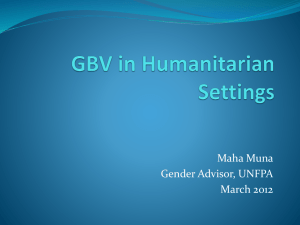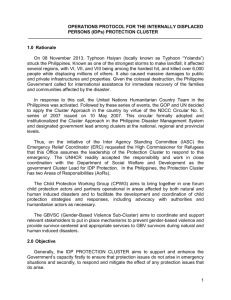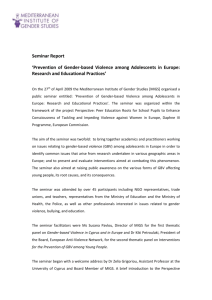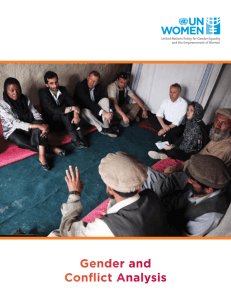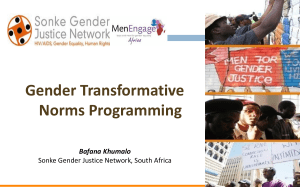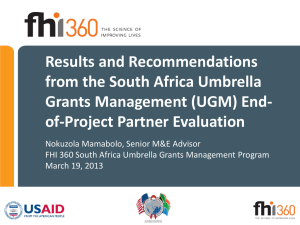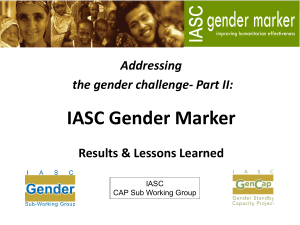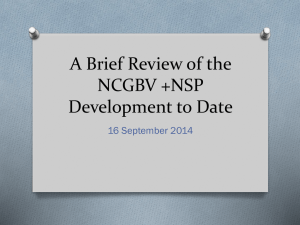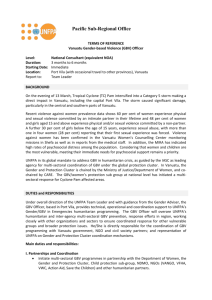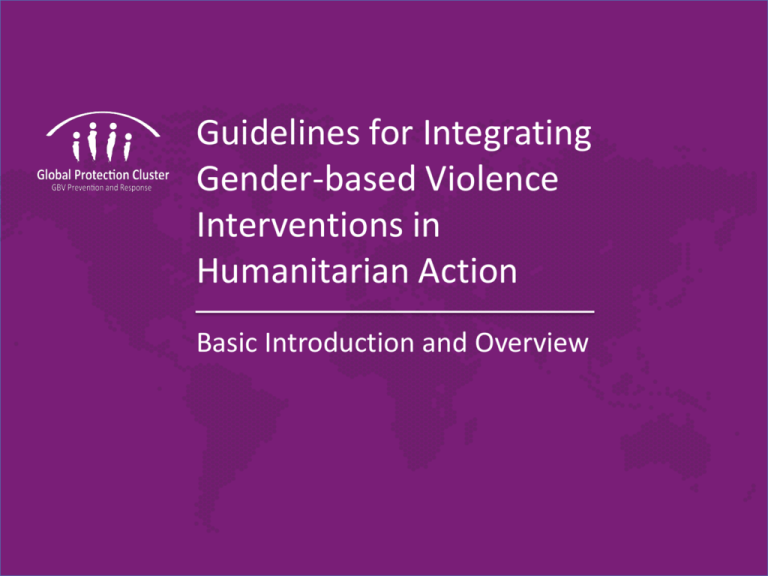
Guidelines for Integrating
Gender-based Violence
Interventions in
Humanitarian Action
Basic Introduction and Overview
What is gender-based violence?
Guidelines for Integrating
Gender-based Violence
Interventions in
Humanitarian Action
GBV and AGENCY/SECTOR
• What are some types of GBV that you or your
partners have observed in country contexts
where you’ve worked?
• How are these types of GBV being addressed
by AGENCY/SECTOR and its partners? Who
are the responsible parties?
Guidelines for Integrating Gender-based Violence Interventions in Humanitarian Action
Definition of GBV in the
Guidelines:
GBV is an umbrella term for any harmful act that
is perpetrated against a person’s will and is
based on socially ascribed (i.e. gender)
differences between males and females. It
includes acts that inflict physical, sexual or
mental harm or suffering, threats of such
actions, coercion and other deprivations of
liberty.
Guidelines for Integrating Gender-based Violence Interventions in Humanitarian Action
Key Points - context
• GBV is rooted in gender and power inequalities that exist
outside of conflict or disaster.
• However, there are particular ways that GBV can manifest
in an emergency context.
•
Efforts to reduce GBV in emergencies must therefore
address the immediate needs of affected populations
AND promote long-term social and cultural change
toward gender equality
Why is GBV exacerbated in emergencies?
(some examples)
•
New threats/forms of GBV related to conflict
•
Increased vulnerability and dependence; exploitation
•
Lack of privacy; overcrowding; lack of safe access to
basic needs
•
Separation from family members; lack of
documentation; registration discrimination
•
Break down of protective social mechanisms and
norms regulating behaviour
Guidelines for Integrating Gender-based Violence Interventions in Humanitarian Action
Key Points: programming
• Always assume that GBV is occurring.
• Obtaining prevalence data is not a priority at the
onset of an emergency.
• Because of under-reporting and the risks associated
with obtaining data, the priority is to establish
prevention and response measures as soon as
possible.
Introducing the 2015 IASC
Guidelines for Integrating GBV
Interventions in Humanitarian Settings
(“GBV Guidelines”)
Guidelines for Integrating
Gender-based Violence
Interventions in
Humanitarian Action
Who is familiar with this book?
(Hint: this is the 2005 Version!)
• Did you use it? How?
• What worked?
• What didn’t?
Guidelines for Integrating Gender-based Violence Interventions in Humanitarian Action
Well, it’s still purple…
Guidelines for Integrating Gender-based Violence Interventions in Humanitarian Action
Introducing the GBV Guidelines:
Purpose
Provide standardized sets of recommendations
across all sectors of humanitarian response for:
planning, implementation, coordination,
monitoring and evaluation of essential actions for
prevention and mitigation of GBV.
Guidelines for Integrating Gender-based Violence Interventions in Humanitarian Action
Prevention & Risk Mitigation
Prevention = taking action to stop GBV from first
occurring
• scaling up activities that promote gender equality
• working with communities to address practices that
contribute to GBV
Risk Mitigation = reducing the risk of exposure to
GBV
• ensuring sufficient lighting and security patrols are in
place when establishing displacement camps
• placing locks on the inside of latrines
Guidelines for Integrating Gender-based Violence Interventions in Humanitarian Action
Introducing the GBV Guidelines:
Audience & Context
• Target audience: primarily non-GBV specialists
Key message: should not add to workloads!
Can be used as a mainstreaming tool to make
current programming safer and more effective
• Address risks across all humanitarian contexts,
including conflict and disaster
• Consider sexual violence as well as multiple
other forms of GBV
Guidelines for Integrating Gender-based Violence Interventions in Humanitarian Action
Introducing the 2015 GBV Guidelines:
Recommendations & Tools
• Recommendations arranged according to
Humanitarian Programme Cycle (HPC)
• Suggested indicators for each element of the
HPC
• ‘Essential actions’ sheets for each sector
• Draw from and build on existing GBV-related
standards across each sector (INEE, CPMS,
Sphere, etc.)
Guidelines for Integrating Gender-based Violence Interventions in Humanitarian Action
HPC adapted for the Guidelines
1. Assessment, Analysis and Strategic Planning
2. Resource Mobilization
3. Implementation (Programming, Policies,
Communication and Information Sharing)
4. Coordination
5. Monitoring and Evaluation
Guidelines for Integrating Gender-based Violence Interventions in Humanitarian Action
Introducing the GBV Guidelines:
Implementation & accountability
• Emphasize responsibility and accountability for
action across sectors, types & levels of actors
“Ensuring Implementation” section (Chapter 4 of
Introduction, beginning on p.18) and standalone
document
Accompanied by a detailed Implementation Strategy
Supported by global level Implementation Support
Team
Guidelines for Integrating Gender-based Violence Interventions in Humanitarian Action
2 Formats:
Example of a
TAG
Comprehensive Book (large!) –
1.
2.
3.
Introduction (what is GBV; obligation to
address GBV in emergencies; etc.)
Background to the TAGs (how they’re
organized; guiding principles)
Guidance for 13 Thematic Areas
Thematic Area Guides or
“TAGs” (small!) –
1.
2.
3.
Intro (same as comprehensive book)
Background (same)
Guidance for ONE thematic area
Guidelines for Integrating Gender-based Violence Interventions in Humanitarian Action
Next steps & more info:
• Global and target country roll out 2015-2016
• Translations pending: Arabic, French, Spanish
• Comprehensive book, TAGs and supporting
materials downloadable at
www.gbvguidelines.org
• Training materials and additional
tools/resources being to be added to website
over time: check back often!
Guidelines for Integrating Gender-based Violence Interventions in Humanitarian Action
For more information:
http://www.gbvguidelines.org/

